Is HIV latency contagious?
Hello, I am Dr. Bobo and I work at the CDC in the field of HIV prevention and treatment. After working for so many years, I have received a lot of counselors and infected people who ask all kinds of questions related to AIDS, among which areIs HIV contagious during the incubation period?Let's explore this together.

AIDS is the English translation of Acquired Immunodeficiency Syndrome, a chronic infectious disease caused by infection of the human body with the AIDS virus (HIV) and characterized by a progressive decline in the function of the immune system. The average incubation period of AIDS is 9 years, which can be as short as a few months if the underlying health condition of the body is poor, or as long as 15 years if the underlying health condition of the body is better and the resistance is stronger. In addition, the incubation period for HIV infection varies among different routes of infection, for example, the incubation period is generally shorter in the case of syringe-sharing infection and longer in the case of heterosexual infection.
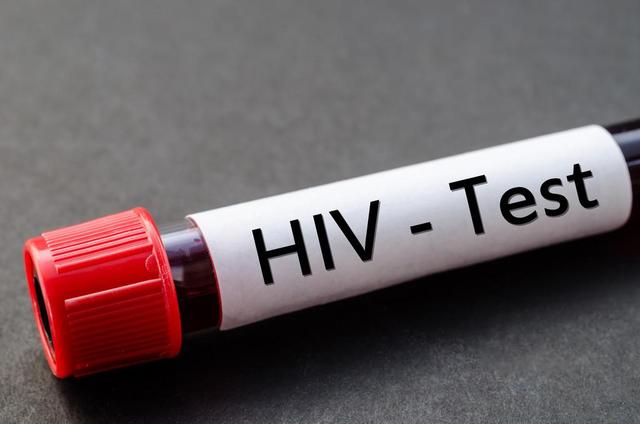
Clinically AIDS is divided into three periods:Acute phase, asymptomatic infection, AIDS.
acute phase: Usually occurring within 2-4 weeks after the initial HIV infection, some infected individuals develop clinical symptoms resulting from HIV viremia and acute damage to the immune system, which are generally mild and last for 1-3 weeks before disappearing naturally. Mild fever is the most common clinical symptom, followed by headache, night sweats, malaise, rash, swollen lymph nodes, and sore throat. These symptoms are very similar to those of a cold and disappear naturally, so they are easily overlooked. During this period, the infection is highly contagious due to HIV viremia.

asymptomatic phase: The acute phase is followed by an asymptomatic phase, and some infected persons will enter the asymptomatic phase of infection without going through the acute phase. This period usually lasts 6-8 years, but its length is related to the viral load in the infected person's body, the type of virus, the route of infection, the immune status of the body, nutrition, hygienic conditions and living habits. During this period, the infected person can live and work without symptoms, but the virus in the body is constantly replicating, the CD4+ T-lymphocytes will continue to decline, the immune system is continuously impaired, and this period is infectious.The asymptomatic phase is epidemiologically important because it has no clinical manifestations, and therefore HIV-infected individuals do not seek medical attention much less find out about it, yet it is contagious.
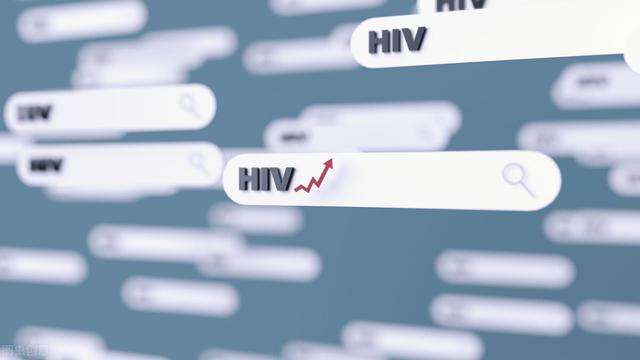
AIDS period: It is the final stage of HIV infection, in which the CD4+ T-lymphocyte count of the patient decreases significantly, mostly below 200, and the viral load of HIV in the body is very high. In this stage, due to the impaired or collapsed function of the immune system, patients are prone to various opportunistic infections, such as tuberculosis, toxoplasmosis, Candida albicans, etc.; they are prone to tumors, such as malignant lymphoma and Kaposi's sarcoma.
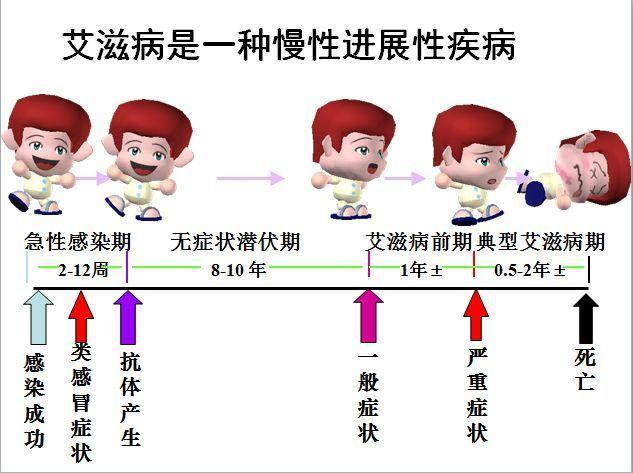
AIDS is contagious during all three periods, with the asymptomatic period lasting longer and often becoming the most important period of transmission.We are now spending a lot of effort on promoting the testing of people who have had high-risk behaviors, the purpose of which is to let this part of the knowledge of their own infection status, take medication in a timely manner, when the body's viral load is lower than the lower limit of detection, the infectiousness of the body will be greatly reduced, which on the one hand, allows the infected person to get their condition under control, and on the other hand, allows more people to not get infected, so I recommend that people who have had high-risk behaviors (such as sharing of Therefore, I suggest that people who have engaged in high-risk behaviors (such as sharing syringes for drug use, unprotected sex, etc.) must get tested in a timely manner.

In my work, I often encounter this problem, that is, people who have had high-risk behaviors suspect that they are infected with HIV based on their so-called symptoms and signs, but do not dare or are not willing to do the test, so I suggest that after having high-risk behaviors, regardless of whether or not there are so-called symptoms and signs, please be sure to go to the CDC or hospitals in a timely manner for examination, and if the diagnosis is confirmed, then as soon as possible to carry out the treatment, and if ruled out, then as soon as possible to forget about this matter and return to normal life. Forget about it and return to normal life.
Back to the question, the incubation period is the period between HIV infection and the onset of disease, during which there is infectiousness without characteristic clinical manifestations, so we can not judge whether a person is infected with HIV by his appearance.Therefore, to prevent AIDS, please be sure to avoid high-risk behaviors.
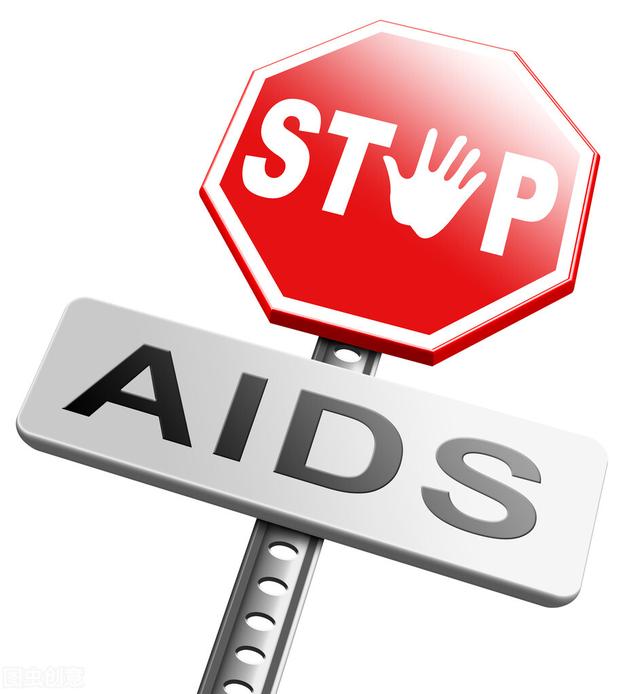
Tail: Every time I will spend a lot of time to check the information, edit the article, although the article reading volume is not high, but I will still insist on it, even if I can help a friend, this is also considered a success, so I hope that you read this article friends can click a support, thank you!
If any of you have more questions about AIDS, please follow Dr. Bobo's private messages for advice.
1. The stages of AIDS are acute, asymptomatic and AIDS. There is no latency period for AIDS.
2. "AIDS latency" literally means "HIV latency", which means that there is HIV in the body, and since there is a virus, there is a possibility of transmission to others.
3, HIV is mainly transmitted through body fluids, taking antiviral drugs for six months, can reduce the virus in the body to the lower limit of the detection value, the infectiousness of the greatly reduced, to protect the immune function, to avoid opportunistic infections.
HIV-infected people in the incubation period are not only contagious, this contagion is also in the spread of AIDSOccupies a very important position.. Unconscious transmission of an infectious disease is far more harmful than accidental transmission where the person knows the other person is infected and is internally alert.
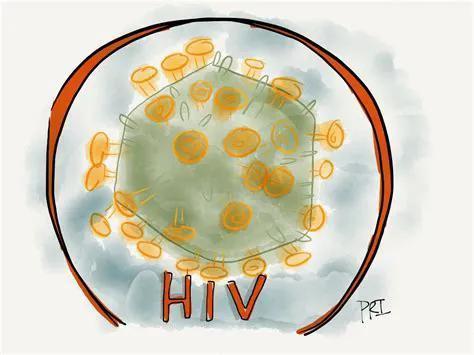
The incubation period is a very important concept in epidemiology, but it is difficult for ordinary people to distinguish between the incubation period and the "window period". Taking AIDS as an example, to put it simply: the incubation period refers to the period of time when one is infected with HIV but has not yet developed symptoms; while the window period refers to the period of time when one is infected with HIV but cannot yet be detected.
The incubation period and the window period both have one thing in common: they are infected with HIV. Therefore, both periods are contagious. There are greater and lesser degrees of contagiousness. When the virus replicates (Reproduction of the next generationmeaning) is high, it is more contagious; when the level of viral replication is low, it is less contagious.
Infected persons in the latent phase of AIDS.There are certain patterns in the size of infectiousnessIn the early stages, HIV replicates in large numbers and is highly contagious. In the early stages, HIV replicates in large numbers and is highly contagious; then the immune system removes some of the virus, leading to a reduction in viral nucleic acid (HIV RNA) and a decrease in contagiousness; and then, when symptoms begin to appear, viral replication becomes active again, destroying the body's immune cells (also known as "CD4+ T-lymphocytes"), leading to a decrease in resistance and an increase in contagiousness. When symptoms begin to appear, viral replication becomes active again, destroying the body's immune cells (also called "CD4+ T lymphocytes"), leading to a decrease in resistance, and the infectiousness increases.

The length of the incubation period may be different for each HIV-infected person since some HIV-infected people have symptoms in the early stages and some do not. And, when it comes to symptoms, what most people think of as symptoms may be completely disregarded and not felt as symptoms by some people to the point ofThe incubation period for certain infections is impossible to determine.
AIDS is transmitted mainly through unprotected sex, blood and mother-to-child transmission.
If a healthy person and an HIV-infected person have high-risk sex, share syringes, and other behaviors, they may be infected, and the probability of infection is related to the number of behaviors, the depth of exposure, etc;The greater the number of times, the greater the probability; the greater the damage caused by the behavior, the greater the likelihood of infection.
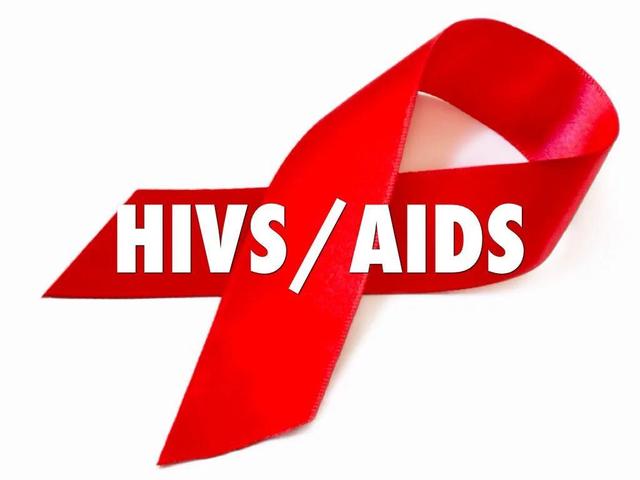
Finally, a reminder to those who may engage in various unsafe behaviors:
1. When the health status of the other party is unknown, you cannot judge that the other party does not have AIDS based on the fact that you cannot see the problem on the outside or that you do not show symptoms;
2. Always use strict safety measures when dangerous behavior occurs, such asUse condoms at all times and take care to prevent condoms from falling off and breaking during use;
3. If you can't do perfect security measuresPrompt administration of HIV-blocking medication (e.g., Gemfibrox or other combination regimen) within 72 hours;
4. If the timing of the block is missed, it is recommended that the3~4 weeks laterPromptly go to the hospital or the Center for Disease Control and Prevention (CDC) to test for HIV antibodies or combined antigen-antibody tests, or you can use test strips to self-test, or inHighly sensitive HIV RNA test or HIV DNA viral bank after 7 daysDetection.

I am a clinician who loves science, seeing patients, consulting, answering questions, solving puzzles, popularizing medical knowledge, and experiencing the power of warm words in the midst of my hurried clinical work!
Feel free to like, comment, retweet and favorite this article if it was useful to you. For more medical knowledge, stay tuned to Dr. Long!
First of all, we need to clarify what is the latent period of AIDS, which means that the patient has been infected with AIDS, and AIDS has already reproduced in the body, but because of the attack of the virus has not yet led to the patient's terminal illness, the patient does not have the physical sensation and the combined complications, we call it the latent period. For example, just like our party members in the Nationalist Region before the Liberation War, although they were members of the Communist Party, because of the special period, they could only do underground work in the Nationalist Region, and they were usually still an ordinary citizen as we all thought.
Secondly, since HIV is present in the body, the virus can be transmitted through bodily fluids, blood and sex, so HIV incubation is contagious and can be detected by blood tests.
Is HIV latency contagious?
The problem is that AIDS is just as contagious during the incubation period. But AIDS is transmitted through blood, breast milk, and sex. It is not a respiratory infection. That's why it's important for people to pay attention to their personal hygiene and clean themselves up.
Is it the new coronavirus or HIV that is serious? HIV is currently incurable, will it become an extinct disease of the human race? If a person is infected with HIV and does not take medication, the virus will endlessly replicate and attack the body's immune system to mutate these. Therefore, if a person infected with HIV takes medicine, it will control the replication and mutation of these, and the transmission of HIV is through blood, sex, and so on. HIV blood does not survive in fruits and vegetables. If an HIV-infected person injects blood into all animals, it will live and spread. Some mammals, such as rats, rabbits, monkeys, snakes, dogs, wild boars. In the river turtle, crab, etc., flying in the sky, running on the ground inside all the animals, the animal reproduces again to increase the number of animals will be infinite replication. Outside running animals infected with HIV will not be able to take medication, can not be controlled, will be infinite replication and mutation, for fear that the years will be brought to the society of mankind may be no cure. So HIV is transmitted in animals, more terrible than human-to-human transmission, more serious pathogenic. HIV patients should never go this way. So we have to protect the privacy of HIV infected patients, care and care well. I have been working in a village health center for eight years. HIV-infected people had better farm less, for fear that when they accidentally have trauma, by chance they also have trauma on the farmed animals, for fear of unintentionally infecting the animals. Fear of giving humans no cure? Free distribution of HIV poisons in order not to scourge infected to others, infected people should never go to harm others. There are also a lot of HIV self-financed drugs, expensive, but some better than free drugs antiviral effects and fewer side effects, the average poor people can not afford to treat, take up ah ...... HIV may be on the human immune system is constantly harming, the more laborious and hard work, it will be invisible the more serious injuries to the body, infected not only to rest well, but also eat well! Nutrition to keep up, etc.
There is currently no cure for AIDS, but AIDS is not a disease that can wipe out the human race. I once read a study that simulated the spread of AIDS and the number of human beings, and the program, after several decades of calculations, found that the spread of AIDS to death did not have the same effect on human beings as the influenza virus and some other infectious diseases, such as the bubonic plague.
Although AIDS cannot be cured, the method of its transmission has now been clearly found, and with the vigorous popularization of science, the way of transmission of AIDS, even in the rural villages of the doctor's bulletin board inside, can be said to be widely known.
More and more people know that HIV is transmitted from mother to child, blood to blood and sexually. At the same time, more and more people know that the use of condoms can effectively prevent the spread of HIV. For those who are currently infected with HIV, it is also possible to try to prevent the fetus from becoming infected with HIV by means of interruption.
Although it can not be cured, but can achieve effective prevention, and for people who have been infected with AIDS, but also through the antiretroviral treatment to control the development of the disease, to improve the quality of life of patients, is to prolong the life of patients.
So although AIDS cannot be cured, it can be effectively prevented, and there are also medicines to control the condition, is to prolong life. So AIDS will not be the cause of our human extinction at all. As long as you clean yourself up, you can basically do away with AIDS.
It should be fine. It's a latent virus.
This question and answer are from the site users, does not represent the position of the site, such as infringement, please contact the administrator to delete.